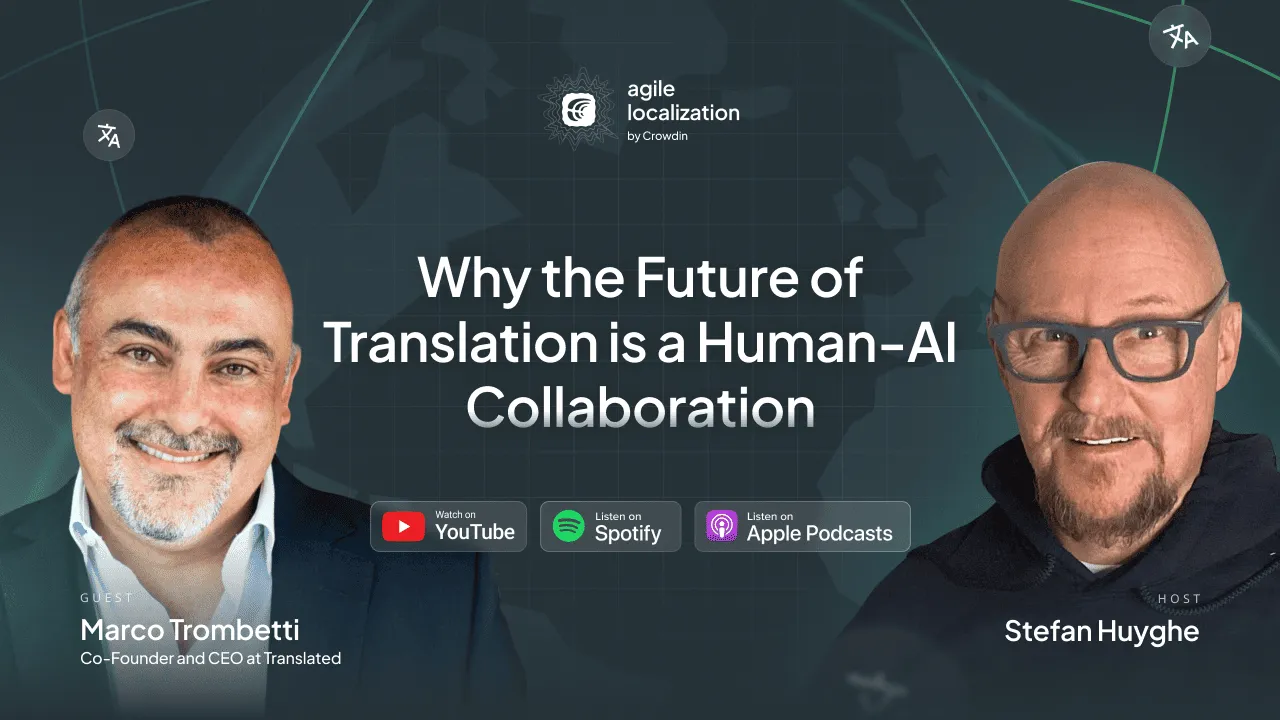If AI can translate entire websites in seconds, where does that leave human translators? According to Marco Trombetti, Co-founder and CEO of Translated, we’re just getting started.
In this episode of The Agile Localization Podcast, hosted by Stefan Huyghe and powered by Crowdin, Marco breaks down why the future of translation isn’t a battle between man and machine, but a collaboration where the best of both worlds shines.
From adaptive MT to specialized models like Lara, Marco shares how AI and humans can elevate each other, especially in a multilingual, multicultural world that demands both speed and nuance.
Listen to the new episode on:
The Magic Happens at the Intersection of AI and Human Insight
Translated’s motto, “We Believe in Humans”, isn’t just branding. It’s a philosophy baked into every decision Marco and his team have made since 1999. While many tech companies rush to automate, Translated takes a more symbiotic approach, building tools that help professional linguists do their best work faster.
Their latest innovation, Lara, is a custom model trained specifically on professional translation data. Unlike generic LLMs, Lara is grounded in 25 years of human feedback, complete with annotations, commentary, and even translator-revisor debates. This rich, structured data enables Lara to reason through translations instead of simply predicting probable word sequences.
Not All Content Deserves the Same Translation Approach
Marco explains why finding the right balance between AI localization and human involvement is critical and contextual. Take a customer review on an eCommerce platform. It may be more believable if translated quickly by AI, preserving the imperfections of the original. But for a global campaign slogan like “Just Do It”, deep cultural research and human creative talent are irreplaceable.
"Every type of content deserves a matching level of investment.
That’s why we need a continuum of translation services, from raw machine output to high-touch human adaptation, and everything in between.
Why Quality Looks Like It’s Falling, But Actually Isn’t
Here’s a counterintuitive truth Marco shares: the average translation quality is going down because we’re translating so much more. Before automation, only high-value content was translated. Now, thanks to MT, companies can localize millions of user reviews, messages, and listings that were previously out of scope.
As a result, quality appears to drop. But in reality, the standard for professionally localized content is rising. And as localization gets more efficient, companies reinvest in quality where it matters most: UI, onboarding flows, and marketing copy that drives conversions.
The Unfair AI Gap in Lesser-Resourced Languages
While AI shines in English and a handful of high-resource languages, the gap is vast for the rest of the world. Marco estimates it would take 500 years for Swahili to reach the same amount of training data as English, unless we intervene.
The solution? Human translators.
Every human-translated Swahili sentence generates new, high-quality data. It keeps the language relevant in global tech ecosystems and ensures brand consistency across markets.
Language Pros Hold the Key to Better Language Models
One of the most powerful insights in the episode? The language services industry is sitting on a goldmine: decades of clean, structured, bilingual data.
While LLMs have been trained mostly on English web content, the language industry has high-quality translation memories, glossaries, and QA discussions in dozens of languages. Marco sees a massive opportunity for LSPs to play a leading role in shaping multilingual, multicultural language models.
However, there’s a catch: to stay relevant long-term, the industry must evolve from text-only to multimodal content and from static datasets to learning through interaction, just like humans.
Final Thoughts From Marco
AI is not the end of localization; it’s the start of a bigger playing field. As Marco sees it, AI is a reflection of humans. A tool to elevate their work, not erase it. The future of localization isn’t binary. It’s a fusion of data and culture, speed and nuance, machine learning and human spirit.
Marco’s Background
Marco Trombetti is the CEO and founder of Translated, a pioneering AI-powered localization company established in 1999. As a visionary leader in language technology, he spearheaded the development of groundbreaking solutions, including MateCat, ModernMT, and most recently, Lara, an innovative AI model specifically trained on professional translation data. Marco is renowned for successfully combining AI advancement with a human-centric approach, embodied in Translated’s motto “We believe in humans.”
Listen to the new episode on:
Yuliia Makarenko
Yuliia Makarenko is a marketing specialist with over a decade of experience, and she’s all about creating content that readers will love. She’s a pro at using her skills in SEO, research, and data analysis to write useful content. When she’s not diving into content creation, you can find her reading a good thriller, practicing some yoga, or simply enjoying playtime with her little one.
